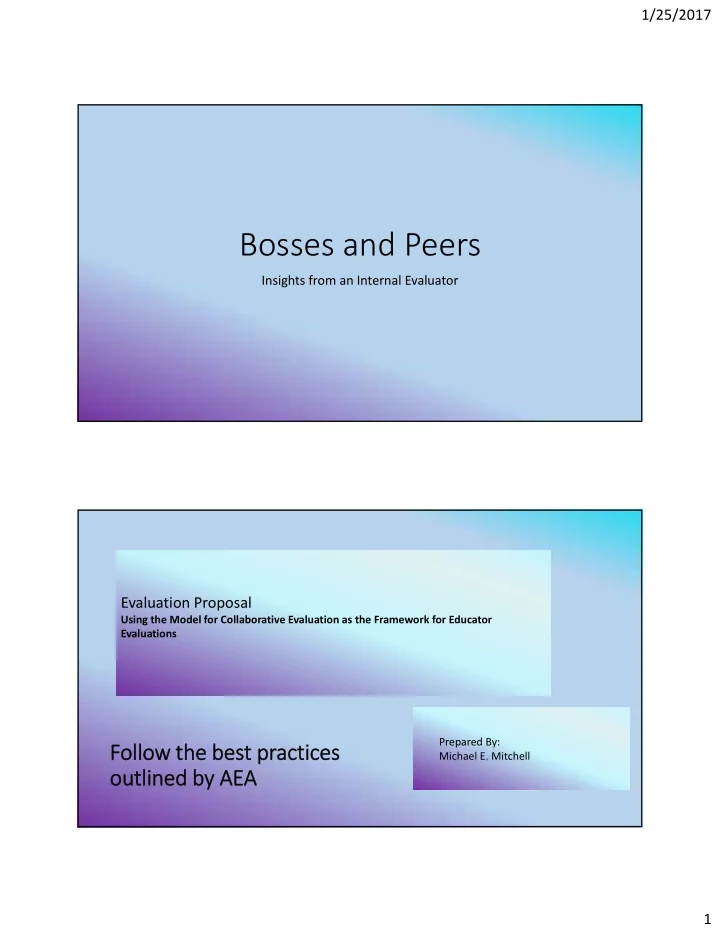

1/25/2017 Bosses and Peers Insights from an Internal Evaluator Evaluation Proposal Evaluation Proposal Using the Model for Collaborative Evaluation as the Framework for Educator Using the Model for Collaborative Evaluation as the Framework for Educator Evaluations Evaluations Prepared By: Prepared By: Follow the best practices Michael E. Mitchell Michael E. Mitchell outlined by AEA 1
1/25/2017 MCE was the best approach Using the perspective of the Leader‐Leader Management style (Marquet 2012) PROPOSAL HIGHLIGHTS Identify background context and need Identify background context and need Present a collaborative approach to the evaluation Present a collaborative approach to the evaluation Propose a system of personnel evaluation to increase Propose a system of personnel evaluation to increase knowledge, skills, abilities, and motivation of team knowledge, skills, abilities, and motivation of team members members 2
1/25/2017 Acknowledge the Hawthorn Effect and Campbell’s Law • Hawthorne Effect, also known as the Observer Effect • As the internal evaluator your associates may behave differently • Make sure the lines of communication are wide open especially at the inception • Campbell’s law: gaming the system in social settings Benefits of the Evaluation Benefits of the Evaluation Allows professional and personal growth of educators and staff Allows professional and personal growth of educators and staff Establishes clear goals for employers and employees to agree upon Establishes clear goals for employers and employees to agree upon Creates a constructive and fair way to provide feedback to employees Creates a constructive and fair way to provide feedback to employees Increases employee morale Increases employee morale Saves time Saves time Survey Results Quarter 1 Faculty / Counselor Feedback Continued observations will benefit me Adequate prep time Peer Post‐reflections were helpful Benefitted from observing a peer Professional development helpfulness Activities help with summative evaluation Utility of peer feedback Goal Input 0 1 2 3 4 5 6 Strongly Agree Agree Neither Agree Nor Disagree Disagree Strongly Disagree Not Applicable 3
1/25/2017 Survey Results 2 I spent ___ total minutes in my reflecting meetings this quarter. 4 3.5 3 2.5 2 1.5 1 0.5 0 Time spent in Peer Reflections Less than 10 '11 ‐ 20' '21 ‐ 30' More than 30 Conclusions • The new evaluation system is for the most part valued and well received • Sufficient resources were dedicated to allow for reflections • Challenges present themselves in small‐unit evaluations, • Be honest, forthright, and above all protect participant rights 4
1/25/2017 Perspectives ‐ Advantages • Informal conversations can provide valuable insight • Including the counselor in the observation activities gave teachers greater understanding into the daily activities of the counselor • Greater understanding lead to greater appreciation • Trust among leader/peers can lead to in‐depth insight Perspectives ‐ Disadvantages • The leader/peers may behave differently knowing the evaluator is either formally or informally • Particularly those that may be dissatisfied • Anonymity may be difficult to maintain • Particularly in smaller settings 5
1/25/2017 Biography, Michael E. Mitchell Mr. Mitchell is a Certified Evaluator and Metaevaluator, obtaining his certification at the University of South Florida under the internationally renowned evaluator Dr. Liliana Rodriguez‐Campos. He has performed numerous program evaluations and metaevaluations for various clients. He is also a National Board Certified High School teacher teaching biology, anatomy and physiology, marine science, and computer technology at Florida SouthWestern Collegiate. His master’s degree is in Marine Science and he worked at the then Florida Marine Research Institute (now the Florida Wildlife Research Institute), helping to develop the statewide Fisheries Independent Monitoring Program. Mr. Mitchell coauthored multiple peer‐reviewed articles in the marine fisheries field and in the field of evaluation. He also was a computer consultant, building several commercially used database programs and provided systems and network support to businesses. Currently, in addition to his teaching and evaluation consulting activities, Mr. Mitchell is working toward a Ph.D. in Educational Research and Measurement and Evaluation at the University of South Florida 6
Recommend
More recommend